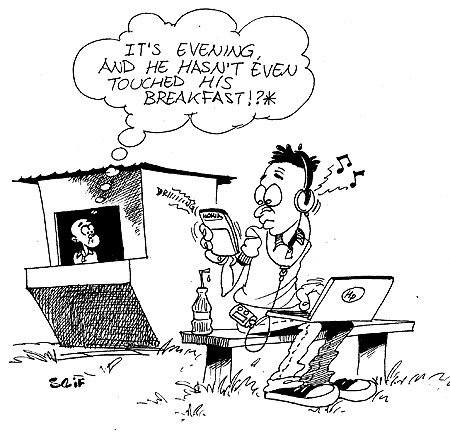On a recent holiday, I decided to abstain from all forms of modern technology - no mobile, no email, no internet. I had read several reports about the rise in the number of young people spending up to 18 hours a day playing online games or on Facebook and Twitter, and was aware of a fierce debate raging among psychiatrists and psychologists about internet addiction.


On a recent holiday, I decided to abstain from all forms of modern technology - no mobile, no email, no internet.
I had read several reports about the rise in the number of young people spending up to 18 hours a day playing online games or on Facebook and Twitter, and was aware of a fierce debate raging among psychiatrists and psychologists about internet addiction.
I had also noticed that an increasing number of people seem glued to their mobiles.
Having it in a handbag is not enough. It has to be on the desk or on the dinner table, held in the hand or stuck to an ear. It’s almost as if, without mobile phones and the internet and Facebook and Twitter, we would all cease to exist.
I didn’t think I had even the remotest addiction to my electronic toys - after all I’m not a big Facebook user, nor am I on Twitter and I don’t even own a phone that can access emails.
I thought of myself as something of a Luddite. Until a few weeks ago, when I lost my mobile. I became so anxious that I almost hyperventilated. Which was why I decided to go cold turkey while on holiday.
The first day was bliss - swimming, reading, de-stressing, no interruptions or distractions. I had a few urges to switch on my phone, but I managed not to succumb.
But then on the second day, while lying by the pool, I became consumed by the thought that something terrible had happened at home.
Oh my God, I thought, what if a member of my family has been in a serious car crash?
What if my niece or nephew has contracted swine flu and is in hospital in intensive care?
What if there’s been a fire? Or someone’s been run over on the way to school? What if one of them has choked or been electrocuted?
With such thoughts rushing through my mind, I could no longer relax. I tried to read. I tried to swim.
But the more I tried to avoid thinking about the terrible thing that had happened at home, the more it preyed on my mind.
‘I’ve got this feeling,’ I said hesitantly to my partner, ‘that something awful has happened.’
He looked at me with a raised, sceptical eyebrow. He knew exactly where I was going with this. He had decided to leave his mobile at home and had suggested I do the same.
Trying to be helpful (I think), he pointed out that if disaster had struck, someone would probably have contacted the hotel.
This placated me for about half a second. But I could contain my anxiety no longer. ‘I’m sorry,’ I said, jumping up from my sun lounger. ‘I’ve got such a strong feeling. I need to check my phone. Just in case.’
I practically sprinted back to our room. Needless to say, there were no urgent messages from home. In fact, there were no messages at all.
But I felt better for having looked. This set the pattern for the rest of the holiday. After managing around 36 technology-free hours, I took my mobile to the poolside and would check it every couple of hours. OK, it was every hour. Possibly even twice an hour.
By the fifth day of the holiday, I was also using the hotel’s business centre once or twice a day to have a look at my emails and read a few news websites.
I don’t know what I was expecting. I don’t do an important job like run a country, or a bank, or a company, or a newspaper. Yes, I sometimes have dead-addicted-lines to meet. But the people I work for knew I was on holiday.
There was absolutely no rational reason for me to need to check my messages and emails. But there was a powerful, irrational one and I couldn’t seem to ignore it.
I suppose it was separation anxiety. I was like a baby whose favourite teddy had been taken from her. Inside I felt lost, disconnected, distressed. Pathetic, I know.
It made me think back to the days before we had the internet and mobile phones. How did we cope? Were we all so much more relaxed?
It also reminded me of a recent night out I’d been on with a group of girlfriends. Two had their iPhones on the table and repeatedly checked them. One, I later discovered, had sent several boring tweets during the meal.
I know I’m guilty of treating my mobile like a vital appendage. But I saw that night how rude and anti-social it can be to engage so enthusiastically with a piece of electronic gadgetry when you are in company.
No wonder Jennifer Aniston ditched John Mayer (if the rumours are to be believed) because of his ‘obsessive use’ of Twitter.
When I got home from holiday, I mentioned technology addiction to one of my friends. She said she was increasingly worried about her husband’s obsession with his handheld computer.
‘When he comes home from work, he’s lucky if he manages 15 minutes talking to the kids before he switches it on,’ she said.
‘And he’s glued to it for the rest of the night. Even during dinner he’d sit gazing at, and interacting with, this thing. I did eventually have to ask him if he could try not using it until the children were in bed.
Daily Mail


